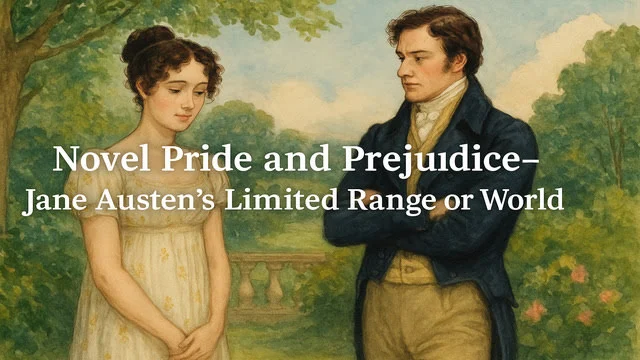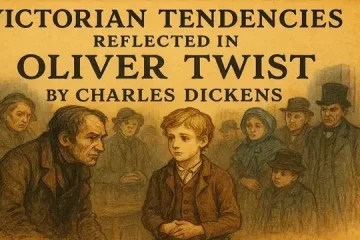Presenting Closely Known Pictures, Sights and Personages:
Jane Austen’s view of life is not extensive. In “Pride and Prejudice,” she paints pictures of that life which she sees at close range. The secret of her power lies in the complete mastery she has, as an artist, over her material. She is alive to her limitation and she never touches a character or scene which she does not know thoroughly. She never invents a story or personage which she does not subject to such minutely intimate treatment that it appears a fragment of autobiography. And herein lies, perhaps, the secret of her success. Her novels have the tattles and trivialities of life in a small country – town where tea – time is an exciting event and subscription ball a crisis in one’s career.
Her Limited Range:
Her range is singularly limited as she does not attempt any wide or wild sweeps in matters of time, place, people, or action. She is sympathetic and tolerant towards the poor, and does not have the faintest weakness for the aristocrat and well – to – do. She is not a social reformer and keeps the underworld outside her novels. There is an absence of simulation of feelings. She ridicules folly but excuses sin and judges men and women by their opportunities in life.
Referring her Work “As Two Inches of Ivory”:
However the exclusions and limitations are deliberate. Jane Austen herself referred to her work as “two inches of ivory”. In a letter to her niece Jane Austen wrote, “three or four families in a country village is the very thing to work on.” Those three or four families are the kind she knew intimately – the landed gentry, the upper classes, the lower edge of the nobility, the lower clergy, the officer corps of the military. The novels including Pride and Prejudice exclude the lower classes, not only the industrial masses of the big cities, but also the agricultural labourers who must have been numerous around Meryton and Longbourn. She hardly touches the aristocracy, and if she does it is only to satirize it – as for instance Lady Catherine de Bourgh. The Bennets, the Lucases, the Bingleys and Darcy all belong to the class of landed country gentry, with the Bennets and the Lucases at the lower end of it and the Bingleys and Darcy with their personal fortunes at the higher end of it. Very rarely as in Pride and Prejudice the country gentry may include people like the Gardiners who are in trade.
Narrow Physical Setting:
Pride and Prejudice like other Jane Austen novels has a narrow physical setting. The story revolves around Netherfield Park, Longbourn, Hunsford Personage, Meryton and Pemberley. Jane Austen manages to keep her characters imprisoned indoors. A trip to the Lake District is cancelled in Pride and Prejudice and the only description of nature and Pemberley is brief and fairly generalized.
Since her settings are the drawing rooms, ball rooms, parks and gardens of a civilized leisure class, she was unlikely to introduce lunatics, villains or ghostly figures. With strict adherence to the probability of life in a country village, she allows nothing terrible to happen. The greatest villainy that disrupts the evenness of a Jane Austen novel is an elopement (Wickham may elope with Lydia) or may arise from an unkind word or social faux – pus as Darcy’s snubbing of Elizabeth at the Netherfield Ball.
Limited Theme to Love and Marriage:
Jane Austen’s theme was also limited to love and marriage. In all of her six novels, there are beautiful girls waiting for really eligible bachelors to get married to. Beyond this, there is no other pursuit to engage them. It was the period of the American war independence, of the French Revolution and of the Napoleonic wars. But Jane Austen’s characters are blissfully unaware of these tumultuous events. The only relevance of the militia in a Jane Austen novel is its ability to provide girls with handsome military officers to flirt with and if possible to marry. Wickham and the other military officers in Meryton in Pride and Prejudice serve as objects for flirtation for Lydia and Kitty the younger Bennet girls.
Feminization of Her Novels:
Another limitation of Jane Austen is the feminization of her novels. Men do not appear except in the company of women. There is no “men talk” or depiction of male sports like hunting. This might be one of the reasons for Darcy not appearing to be a wholly credible character. We never see Darcy except in the company of Elizabeth and since the novel is unfolded from the heroine’s point of view, we look at Darcy through Elizabeth’s eye.
A Sense of Discipline within the Limited World:
The restricted social setting, purely local interests lend a sense of discipline to her art and account for the accuracy and precision of portrayal. Her characters stem from the class and society she knows well and hence they are very realistic and life – like. Elizabeth Bennet is one of the most delightful heroines one could come across in literature. Her characterization is indeed superb. She may choose her characters from the country gentry but no two characters are ever repeated in any of her novels. Mr. Elton, the vicar in Emma is totally different from Mr. Collins the vicar in Pride and Prejudice. Similarly her heroines are all different. Elizabeth is as different from Emma.
Jane Austen’s Ironic View:
It is true that Jane Austen’s view is essentially ironic and hence she chooses only those aspects of social behaviour that can lend themselves to ironic treatment – the inconsistencies and follies of human behaviour, hypocrisy, pretentiousness, incongruities of speech and conduct, self-deception. Love, courtship and marriage are the themes of Jane Austen’s novels, so it is impossible to keep the feeling out of such a novel.
The Significant Emotions:
Jane’s emotional involvement with Bingley is nothing but a matter of heart as also the Darcy – Elizabeth affair. The emotional conflict in Elizabeth when she refuses Darcy’s proposal and later when she recognizes her own blind prejudices on receiving his letter of explanation, are all very finely delineated. In Jane Austen, emotions are experienced within a social frame work and hence they are controlled, but they are not absent.
Admiration of Moral Values:
The moral concern in unobtrusive, but ever present and Jane Austen skillfully portrays the marriages of Lydia and Wickham, Collins and Catherine and the Bennets which by contrast serve to highlight the propriety of the Elizabeth – Darcy marriage which is seen in the social context of the stability and happiness it brings not just to themselves, but to everyone around them.
Unparalleled in Skill in Plot Construction:
In Pride and Prejudice not a single event or character is out of place and each contributes to the development of plot and theme. Following a logical and coherent pattern , the plot of Pride and Prejudice proceeds like that of a drama from exposition, with the characters being introduced in the first few chapters, the development of the complication with Bingley’s departure from Netherfield and Elizabeth’s prejudice against Darcy, to the brilliant climax at Hunsford parsonage where Darcy proposes and is rejected, to the final denouement and resolution with the marriages of the Bennet sisters after the Lydia – Wickham elopement. The sub – plots of Lydia and Wickham, Charlotte and Collins are all closely linked to the main Elizabeth – Darcy plot and highlight the theme of the right marriage.
No Vulgarity of Sex:
Jane Austen is a woman, writing about woman on themes that interest women. There is no much dancing, card playing, visiting and even men are viewed from the standpoint of women. Exclusive men – sports and conversations are absent from her novels. Her novels are clean of sex and horse – play. No maiden blushes on the talk that is not for her. There is no vulgarity, obscenity and loose – talk in her novels.
Thus we see that Jane Austen’s canvas is small but she works such fineness and artistry that amazes the discerning art critics. She is the envy of many an artist and they pay rich tributes to her genius.




